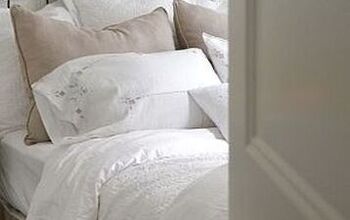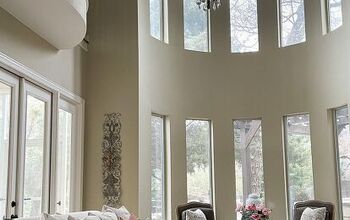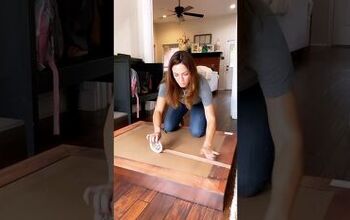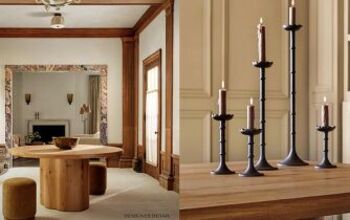17 Home Decor Superstitions: Myths & Beliefs That Shape Our Spaces

Home is more than just a place where we live; it’s a sanctuary that reflects our personality, comforts us, and in some cases, it’s believed to influence our luck and well-being.
Throughout history, cultures worldwide have developed various superstitions related to home decor—rules and beliefs that are said to invite prosperity, protect against bad luck, or maintain harmony within the household.
Whether you’re a staunch believer in these superstitions or simply curious, here’s a look at some of the most common home decor superstitions and the reasoning behind them.
Table of contents
- 1. The Lucky Horseshoe
- 2. Mirrors and Their Mystical Powers
- 3. The Importance of Feng Shui
- 4. Plants and Prosperity
- 5. Wind Chimes and Positive Energy
- 6. The Evil Eye Protection
- 7. The Mystery of the Red Front Door
- 8. The Power of Salt
- 9. The Guardian of Brooms
- 10. The Protective Role of Elephants
- 11. The Good Luck of Acorns
- 12. The Symbolism of Fish Tanks
- 13. The Significance of Bells
- 14. The Myth of Broken Clocks
- 15. The Symbolic Meaning of Curtains
- 16. The Protection of Dragons
- 17. The Magic of Crystals
Disclaimer: Redesign may receive a small affiliate commission from purchases made via links in this article but at no cost to you.
1. The Lucky Horseshoe
One of the most well-known symbols of good luck, the horseshoe has been used as a protective talisman for centuries. It’s often placed above doorways to ward off evil spirits and bring good fortune to those who enter the home.
- The Superstition: The horseshoe should be hung with its ends pointing upward in a “U” shape to ensure that the luck doesn’t "spill out."
- Origin: This belief dates back to the ancient Celts, who believed that iron could ward off evil spirits. The shape of the horseshoe, resembling the crescent moon, was also associated with the protection of the goddesses.
Wonder Care Horseshoe - Authentic Used Horseshoe Good Luck Charm
2. Mirrors and Their Mystical Powers
Mirrors are more than just functional decor items; they are often considered portals to the spiritual world in various cultures. The placement of mirrors in the home is crucial, according to superstitions.
- The Superstition: Mirrors should not face the bed, as they are believed to invite bad dreams or even steal your soul while you sleep. Some also believe that a mirror facing the front door reflects energy out of the home, preventing wealth and good fortune from entering.
- Origin: The idea that mirrors are connected to the soul comes from ancient beliefs, such as the idea that mirrors can trap spirits or that breaking a mirror brings seven years of bad luck due to the soul being damaged.
For more information, read 9 Places in the House You Should Never Put Mirrors.
3. The Importance of Feng Shui
Feng Shui is an ancient Chinese practice that involves arranging your living space to create balance and harmony with the natural world. It’s a complex system that takes into account the direction your home faces, the placement of furniture, and the use of elements like water and wood.
- The Superstition: Clutter is said to block the flow of energy (or "chi"), leading to stagnation in your life. Likewise, having your bed directly in line with the door is known as the "death position" in Feng Shui, as it resembles the way coffins are carried out of rooms.
- Origin: Feng Shui has been practiced for thousands of years in China, where it was initially used to orient buildings in harmony with nature. It’s based on Taoist principles, particularly the idea of balancing the forces of yin and yang.
4. Plants and Prosperity
Plants are a popular element in home decor, not just for their aesthetic appeal but also for the positive energy they are believed to bring.
- The Superstition: Certain plants are said to attract wealth and prosperity, while others might bring misfortune. For example, jade plants and money trees are believed to invite financial success, whereas plants with sharp leaves or thorns, like cacti, are thought to attract negative energy.
- Origin: Many of these beliefs come from Feng Shui, where the type, placement, and care of plants are carefully considered to enhance the flow of positive energy in the home.
Sunset Jade Plant - Crassula - Easy to Grow House Plant - 4" Pot
Costa Farms Money Tree Plant
5. Wind Chimes and Positive Energy
Wind chimes are often used to add a pleasant sound to the home environment, but they are also believed to have the power to influence the energy in and around the house.
- The Superstition: Hanging wind chimes at the entrance of your home is said to attract positive energy and keep negative influences at bay. The number of rods in the chime also matters; for instance, six-rod chimes are believed to be especially auspicious.
- Origin: Wind chimes have been used in Asia for centuries, particularly in China and Japan, where they are often associated with luck and prosperity. The gentle sounds are believed to disperse bad energy and invite peace and harmony into the home.
6 Pipe Wind Chimes for Home | Home Decor Items
6. The Evil Eye Protection
The "evil eye" is a look that is believed to cause harm to the person at whom it is directed, usually out of envy or malice. Many cultures have developed talismans or home decor elements to protect against this malevolent force.
- The Superstition: Hanging an evil eye amulet, often in the form of a blue glass bead, in your home is said to protect you from negative energy and ill intentions from others. It's commonly placed near entryways or windows.
- Origin: The belief in the evil eye spans across many cultures, including the Middle East, Mediterranean, and South Asia. The talisman is designed to reflect the gaze back to the sender, neutralizing any harmful effects.
Hanging Crystal Angel Suncatcher Blue Evil Eye Protection and Good Luck Charm
7. The Mystery of the Red Front Door
In some cultures, the color of your front door can have significant symbolic meaning, particularly red.
- The Superstition: A red front door is often seen as a symbol of welcome and prosperity. In Feng Shui, a red door invites positive energy into the home. In some traditions, it also represents protection and good fortune.
- Origin: This belief has roots in various cultures, including early American traditions where a red door indicated a hospitable home, and in Chinese culture, where red is associated with luck, happiness, and protection.
Peel-and-Stick Sample: Heritage Red by Benjamin Moore
8. The Power of Salt
Salt has long been associated with protection and purification in various cultures.
- The Superstition: Sprinkling salt in the corners of a new home is believed to ward off evil spirits and negative energy. Some also place a small bowl of salt near the entrance to absorb bad vibes.
Personally, I love a Himalayan salt lamp.
Himalayan Glow 1002 Crystal, 6-8 Lbs, Salt Lamp, Corded
- Origin: This practice stems from ancient beliefs where salt was considered a powerful substance for cleansing and protection. In many traditions, salt is used in rituals to purify spaces and objects.
9. The Guardian of Brooms
Brooms are not just cleaning tools; they carry significant symbolic weight in many cultures.
- The Superstition: Never bring an old broom into a new home, as it’s believed to carry the old dirt and negativity with it. Similarly, brooms should not be swept across the threshold at night, as it could sweep away good luck.
kelamayi Upgrade Broom and Dustpan Set
- Origin: This superstition is common in various cultures, including African and Southern U.S. folklore, where brooms are often associated with sweeping away bad energy and misfortune.
10. The Protective Role of Elephants
Elephants are revered in many cultures, particularly in Asia, as symbols of wisdom, strength, and protection.
- The Superstition: Placing an elephant figurine with its trunk facing upwards near the entrance is said to bring good luck and protect the home from misfortune. Some believe that a pair of elephants, one on each side of the entrance, enhances this protective power.
New Good Luck Decorative Gold Antiqued Elephant Glass Bowl, Terrarium or Candle Holder
- Origin: This belief is rooted in Hindu and Buddhist traditions, where elephants are considered sacred animals. The upward-facing trunk is thought to shower blessings and good fortune upon the household.
11. The Good Luck of Acorns
Acorns are often seen as symbols of potential and prosperity.
- The Superstition: Keeping an acorn on a windowsill or hanging an acorn charm in your home is believed to attract abundance and protect the household from lightning and other natural calamities.
BOHON Thanksgiving Decorations Acorn Lights String 10ft 40 LEDs
- Origin: This superstition comes from Norse mythology, where the oak tree, and by extension the acorn, was sacred to Thor, the god of thunder. The acorn was believed to hold protective powers against lightning.
12. The Symbolism of Fish Tanks
Fish tanks are more than just decorative elements; they are believed to influence fortune.
- The Superstition: Placing a fish tank in the wealth corner of your home (often the southeast corner) is said to attract wealth and prosperity. It’s important to keep the tank clean and the fish healthy to maintain good fortune.
Aqueon LED MiniBow Small Aquarium Fish Tank Kit with SmartClean Technology
- Origin: In Feng Shui, water is associated with wealth, and fish symbolize abundance. The combination of water and fish in a tank is believed to activate the flow of money and good luck in the household.
13. The Significance of Bells
Bells have been used in various cultures for centuries to ward off evil spirits and negative energies.
- The Superstition: Hanging a small bell near the entrance or in a window is believed to keep away malevolent forces and attract positive energy. The sound of a bell is thought to purify the space and bring harmony.
2 Pieces Witch Bells Protection for Door Knob Hanger
- Origin: This practice is common in Asian cultures, where bells are used in temples and homes to maintain a peaceful and protected environment. The ringing of bells is seen as a way to clear stagnant energy.
14. The Myth of Broken Clocks
Clocks are symbols of the passage of time, and their condition is often linked to the household’s prosperity.
- The Superstition: A broken clock in the home is thought to bring bad luck and should be repaired or removed immediately. It's also considered unlucky to give a clock as a gift, as it symbolizes time running out.
- Origin: This belief is prevalent in Chinese culture, where gifting a clock is associated with a funeral ritual, as the phrase for “giving a clock” sounds like “attending a funeral” in Chinese.
15. The Symbolic Meaning of Curtains
Curtains not only provide privacy but are also thought to influence the energy in your home.
- The Superstition: Red or dark-colored curtains are believed to block negative energy and protect the home, while light-colored curtains are said to invite positivity and brightness. Curtains should be opened in the morning to let in fresh energy and closed at night to keep out negativity.
LEMOMO Red Curtains 52 x 84 Inch Long/Blackout Curtains
- Origin: This belief is linked to various cultural practices, including Feng Shui, where the color and placement of curtains are carefully considered to maintain a harmonious and balanced living space.
16. The Protection of Dragons
In many cultures, dragons are seen as powerful protectors and symbols of strength.
- The Superstition: Placing a dragon figurine in the living room or near the entrance is believed to protect the home from harm and bring good fortune. The dragon should face outward to guard against external threats.
HDCRYSTALGIFTS Crystal 2.4 inch (60mm) Chinese Dragon Crystal Ball
- Origin: This superstition originates from Chinese culture, where the dragon is a revered symbol of power, strength, and protection. Dragons are often associated with imperial power and are believed to safeguard against evil.
17. The Magic of Crystals
Crystals are often used in home decor for their beauty, but they are also believed to hold metaphysical properties.
- The Superstition: Placing specific crystals, like amethyst, rose quartz, or citrine, in certain areas of your home is said to attract love, healing, and wealth. Crystals should be cleansed regularly to maintain their positive energy.
Jovivi Natural Aquamarine Crystal Tree
- Origin: The belief in the power of crystals comes from various ancient civilizations, including the Egyptians and Greeks, who used crystals for protection and healing. In modern times, crystals are used in spiritual practices to enhance the energy of a space.
Conclusion
While home decor superstitions vary widely across different cultures, they all share a common theme: the belief that our living spaces are connected to our well-being.
Whether you adhere strictly to these superstitions or view them as fascinating cultural insights, they offer a unique perspective on the way we design and inhabit our homes.
So, the next time you rearrange your furniture or pick out a new piece of decor, you might find yourself considering not just aesthetics but the potential for a little extra luck as well.
Do you know of any more superstitions related to the home and decor? Share them in the comments below.





















































Comments
Join the conversation